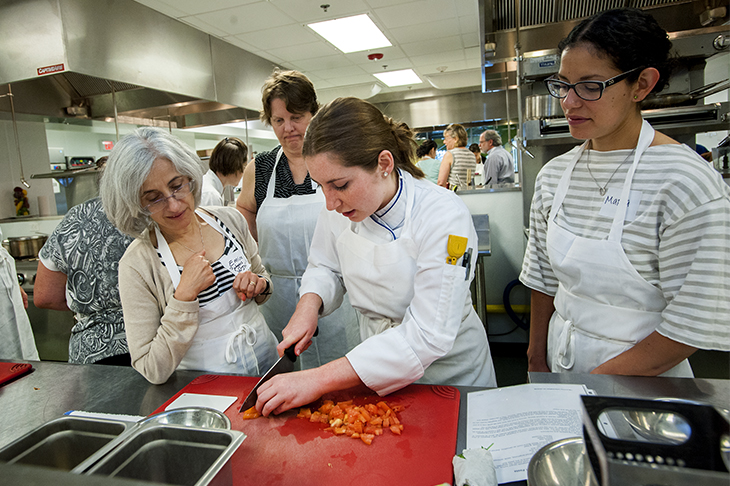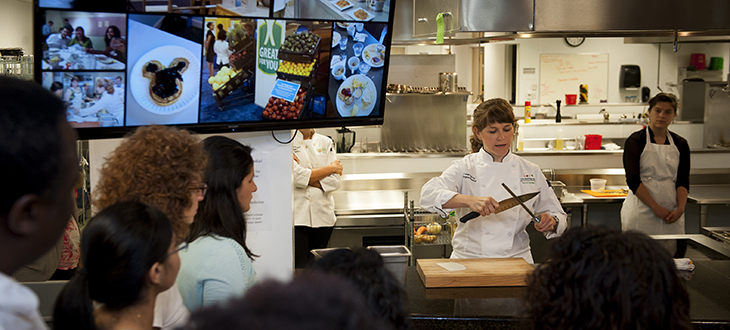Pioneering culinary medicine program spreads nationally

Kelsey Downey (Johnson & Wales Culinary Nutrition, Providence), center, an intern with the Goldring Center for Culinary Medicine of Tulane University, discusses incorporation of fresh vegetables into meals with, from left, Emine Ercikan Abali (Rutgers Robert Wood Johnson Medical School), Linda Knol (University of Alabama College of Human Environmental Sciences) and chef Maria Palma (Christus Children"s Hospital of San Antonio). (Photos by Paula Burch-Celentano)
The Goldring Center for Culinary Medicine hosted a two-day retreat last week for the 13 universities and healthcare centers that license its curriculum to teach medical students culinary skills to better counsel patients about nutrition. The goal was to get feedback to improve and grow the program, and to share successes and challenges others have in creating a “food as medicine” culture within their communities.
More than 40 people participated, including representatives from 11 licensee schools and five other institutions who plan to join, said Dr. Timothy Harlan, Goldring Center executive director.
“These are all organizations that have food, lifestyle and health as their core mission,” Harlan said. “It went quite smoothly with a good balance of exchange of ideas, meeting people at other sites and solidifying the group.”
Some of the suggestions included customizing recipes for regional tastes and offering more options for specialized diets to accommodate those who, for example, want to limit dairy consumption. A participant from Chicago noted that their residents make collard greens differently than those down South, preferring more cosmopolitan spices like turmeric.
Others talked about how they have adapted the program to fit specialized needs within their schools.
Tulane"s program targets first- and second-year medical students, but Arnot Health Graduate Medical Education in Elmira, New York, uses it as an elective for those reaching clinical training in the final two years of medical school. Its “Healthy Kitchens” course accepted 15 students the first year with a growing wait list, said Dr. Beth Dollinger, an orthopedic surgeon who oversees the program.
“The response has been fabulous,” Dollinger said.
Goldring will incorporate retreat suggestions by fall with future plans to add a new course for pediatricians.
Other institutions licensing the program include: University of Texasâ“Southwestern Moncrief Cancer Institute; Texas College of Osteopathic Medicine; UCLA Clinical and Translational Science Institute; University of Illinoisâ“Chicago; Western University of Health Sciences; Rutgers University School of Medicine; University of Coloradoâ“Denver; Michigan State University College of Health Sciences; University of Texas Health Science Centerâ“San Antonio; University of Chicago Pritzker School of Medicine; Mercer University School of Medicine; and Children"s Hospital of San Antonio.

Leah Sarris, executive chef and program director of the Goldring Center for Culinary Medicine of Tulane University, sharpens a knife in a session designed to hone the skills of representatives from 13 universities and healthcare centers that have licensed the Goldring Center"s curriculum.
